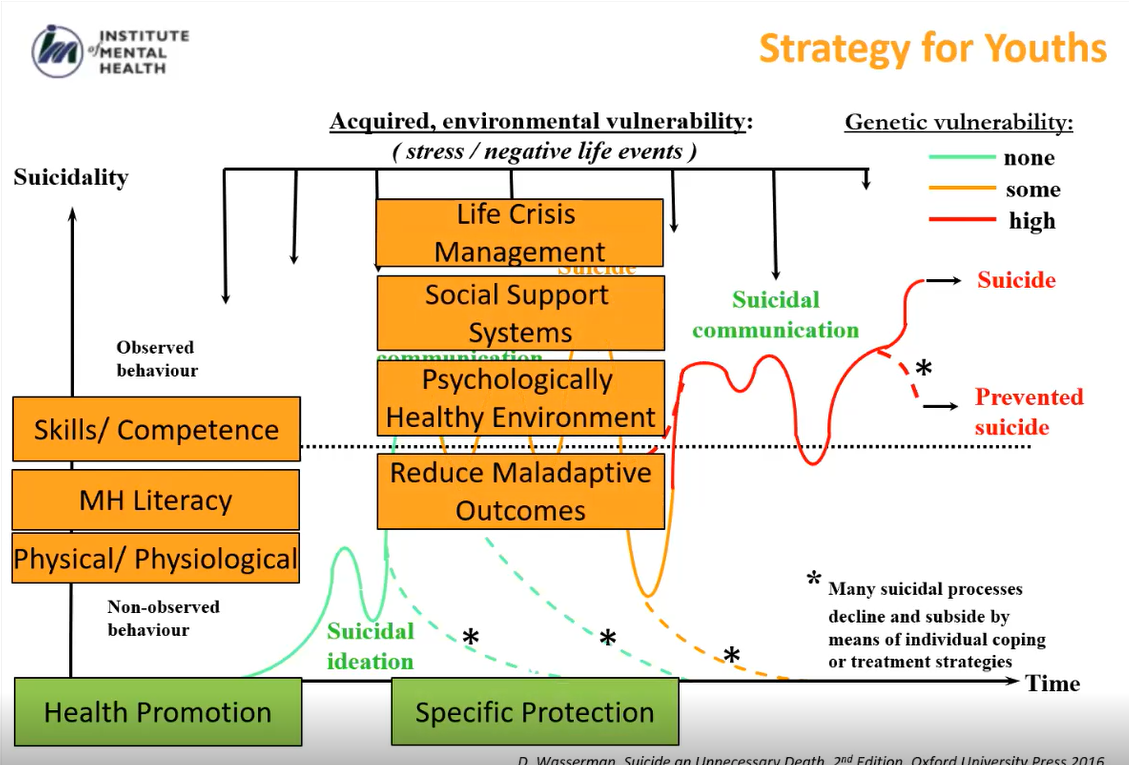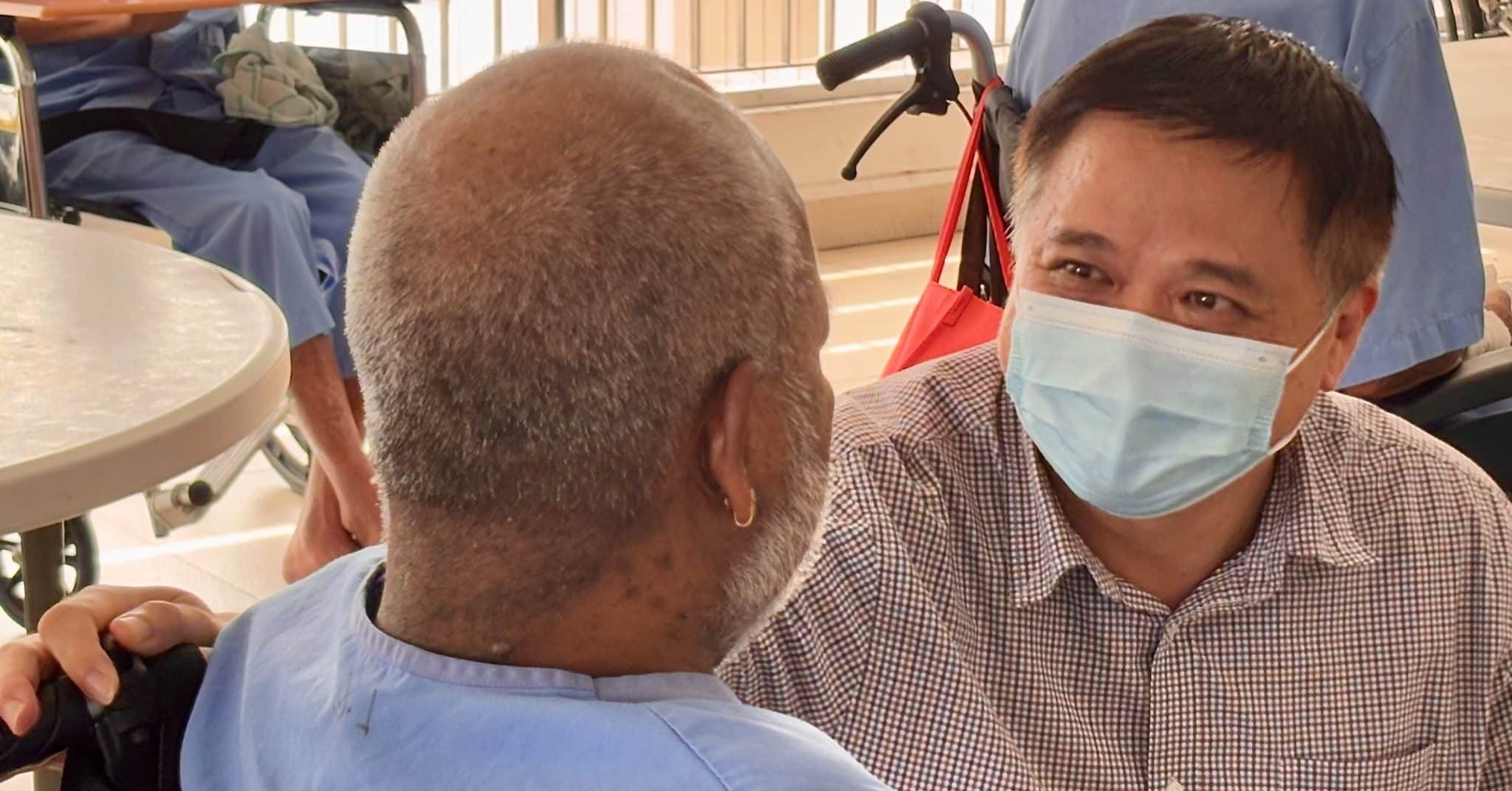“It’s difficult but possible to get through”: Salt&Light Family Night panellists give hope to young people struggling with suicide
by Christine Leow // June 23, 2021, 3:10 pm

Alex Yeo with his fiancee Charmaine Wee. Yeo, who has lived experience with suicide ideation, shared his journey and, together with Salt&Light Family Night panellists, shared tips on managing unhealthy thoughts and fears. Photo courtesy of Alex Yeo.
The first time he felt a strong urge to kill himself was about 10 years ago.
“There were a lot of things that were going on in my life – personal relationship, career, family. My body was so stressed,” said Alex Yeo.
“The ideation came really strongly, it paralysed me for the whole day.”
“I had a vision of me thinking of jumping from a high floor. It was such a clear, vivid image that I could almost feel the whole sensation of falling.”
Yeo, now 30, was sharing his lived experience with suicide ideation at the May 25 episode of the Salt&Light Family Night Zoom chat show on suicide ideation in children and youths.
“The suicide ideation continues to come as a flashback when my body experiences a certain level of stress. There will be the thoughts: It would be so much easier if you don’t have to deal with it. If you do that, all these problems will stop. It’s a very scary thought. A kind of coping mechanism.
“The last recent moment when the ideation came really strongly, it paralysed me for the whole day.”
Yeo, who now counsels youths with similar ideation, he himself continues to go for regular counselling. “It is pretty much a life journey now.”
And he has this message for those who struggle with suicide ideation: “It is difficult but possible to get through.”
The operation and community relation manager with Caring for Life (CFL), an organisation that seeks to create supportive communities familiar with the early signs of suicide ideation, was joined on Salt&Light Family Night by two other panellists.
Adjunct associate professor Daniel Fung is a veteran child psychiatrist and CEO of the Institute of Mental Health (IMH). Pastor Chua Seng Lee, Deputy Senior Pastor at Bethesda Bedok-Tampines Church (BBTC), authored a book on overcoming depression among young people.
Of the close to 600 viewers who signed in to the Zoom session, nearly half (46%) had been personally impacted by suicide, according to a poll conducted that night.
Those they knew of who were thinking of killing themselves were mostly young – 61% of them were aged between 13 and 21 years old. The top factors viewers thought contributed to suicidal thoughts were low self-esteem, lack of meaning in life and academic stress.
Here are some of the issues the panellists discussed as they sought to help those journeying with children and youths struggling with suicide ideation.
What are the suicide trends in Singapore?
“The problem of suicide has always been there,” said Adj A/Prof Fung.
“We don’t talk about it very much because we are still a fairly conservative Asian society. The reality is that suicide is very stigmatising in our society and people find it very hard to talk about it.
“It’s also not something that Christian groups are willing to talk about.”
The comforting news is that, over the last 30 years, Singapore has seen a decline in the number of suicides. Per 100,000 in the population, Singapore has fewer than 10.
“The reality is that suicide is very stigmatising in our society and people find it very hard to talk about it.”
“As a very safe and prosperous country, we have fewer issues than others,” said Adj A/Prof Fung. But every incident is a concern, he pointed out.
And, though the rates are low, there are some troubling trends.
“There are more young suicides. And there has been an increase particularly among boys.”
Since the 1980s, there have been more males – up to three times more – who kill themselves compared to females. This is a reversal of previous statistics.
“This could mean that women are getting more protecting, are less likely to be traumatised and less prone to suicide,” said Adj A/Prof Fung.
What is the cause of suicide?
“This probably has to do with a lot of stress and life events. For the young, as opposed to working adults and the elderly, the causes of suicide often relate to life events,” said Adj A/Prof Fung.
“While a lack of meaning and purpose in life cause suicide ideation and even attempts, they are not what cause suicide deaths.
“If you look at the suicide data, those who have completed suicide, it actually suggests that relational issues have a greater impact.”
“In young people, mental illness is associated with 30% of the suicides. This rises to up to 70% in older people.”
In a general survey in Singapore on mental health, 22% of the population was found to have suicidal thinking. Yet, suicide rates are comparatively low, he said.
“Suicidal ideation doesn’t necessarily lead to suicidal attempt and actual suicide. It depends on a lot of factors: Life events, genetic vulnerabilities because suicide runs in families sometimes, and there are some genetic risks and mental illness.”
In young people, mental illness is associated with 30% of the suicides. This rises to up to 70% in older people.
The most common type of mental illnesses associated with suicide are schizophrenia, depression and bipolar disorder.
“If there is mental illness, it is actually easier to manage suicide because you can treat mental illness.
“The problem is harder if it’s suicidality associated with life’s meaning and purpose. Those are much harder to deal with,” said Adj A/Prof Fung.
Is there a spiritual dimension involved?
Ps Chua shared that he had heard testimonies of people who have survived suicide attempts reporting that they had felt “a force pushing them off the ledge” and there could be a possibility of demonic possession causing suicide.
“It starts with deceiving our minds, causing us to lose our joy, kill our hope and drive us to despair.”
But he cautioned: “We should expand the scope of understanding of the demonic activities in our lives.
“The Bible tells us in John 10:10 that the devil came to steal, kill and destroy.
“It starts with deceiving our minds, causing us to lose our joy, kill our hope and drive us to despair.
“I think that is the larger work of the scheme of the devil.
“And the Bible warns us not to be ignorant of the schemes of the devil (2 Corinthians 2:11). And, therefore, it is important for us to be mindful, to be prayerful and to be watchful.”
Why are young people more vulnerable?
The young have always been easily influenced by media, maintained Adj A/Prof Fung.
“In the past, it would have been mainstream media – television, movies, books, magazines, newspapers.”
Even the games young people play can promote suicide ideation.
“If you romanticise suicide, people think of it as a solution.”
As early as the 1800s, he shared, there were already young people killing themselves over a book that described a young man who had died by suicide. The phenomenon even has a name. It is called the Werther effect, named after the protagonist of the book.
“If you romanticise suicide, people think of it as a solution.”
Today, it is movies like Netflix’s 13 Reasons Why and social media that are romanticising suicide.
Said Adj A/Prof Fung: “Now, it is much more powerful because social media is so immediate and so pervasive.”
Even the games young people play can promote suicide ideation, added Ps Chua who cited online games like the Blue Whale Challenge and the Momo Challenge that prompt young people to kill themselves.
How can I help to prevent suicide?
1. Build resilience
Ps Chua believes this begins with working with the thoughts and emotions of children and youths.
“The reason they think life is not worth living has got to do with the way they process information and stimulation.
“So, there’s a need for us to turn situations around and really think about how we build resilience.”
Resilience, he added, has to do with healthy thinking habits, healthy emotional habits and health relating habits.
Building healthy thinking habits involves evaluating thoughts, identifying wrong ways of thinking and replacing those thoughts with “something that is more reasonable”.
Building healthy emotional habits involves learning how to deal with grief, setbacks and negative emotions.
Building healthy relationships means giving children heroes to look up to and people to inspire them.
“Building healthy emotional habits involves learning how to deal with grief, setbacks and negative emotions.”
“So, they can live more positively rather than be shaped by social media and games,” said Ps Chua.
But not every parent knows how to do this.
Said Ps Chua: “A lot of us grew up on our own. We go through the school of hard knocks and pick up some survival skills. But some of these survival skills are unhealthy.
“The role of the church is to equip parents to bring discipleship back to the home. Home is where discipleship takes place.”
For those who are already struggling with suicidal thoughts, such resilience can mean the difference between thinking and acting.
Said Yeo: “You can’t stop ideation from coming back just by telling someone, ‘You’ve got to stop thinking about it.’ It doesn’t work.
“Resilience is what you do from that point in time. Do you have alternative methods that you can divert attention and energy to? This is preventive per se because then you won’t attempt suicide.”
2. Encourage good health
Caring for the young person’s general well-being can help prevent suicide.
“Understanding their physical needs, their physiological needs, encouraging them to get enough rest, eat well – all these are very important health promotion for suicide prevent,” said Adj A/Prof Fung.
3. Establish strong relationships
“The relationship with our children is very important so that when there are times when they are feeling very distressed and very hopeless, we can respond to that.
“We need to be willing to help in situations where we think it’s difficult. I don’t think you can do something wrong by caring,” said Adj A/Prof Fung.
“One of the meanings of life is being loved. So, if they don’t feel loved, it really affects them.”
To establish strong bonds, parents need to be both demanding and responsive to their children. Such parents are authoritative parents.
Parents who are demanding but not responsive are authoritarian parents. Teens perceive such parents as unloving.
“One of the meanings of life is being loved. So, if they don’t feel loved, it really affects them,” said Adj A/Prof Fung.
Parents who are not demanding but responsive are permissive, and end up spoiling their children.
Apart from relationships within the home, key relationships – with friends and teachers – can also impact an individual.
“There is an interpersonal dimension to our lives that is important to all of us. We are created by God to be social beings, to have relationships,” said Adj A/Prof Fung.
A study of depression in Asia found that when the interpersonal dimension of a person’s life is affected and he feels he does not have good relationships, depression can set in.
Adj A/Prof urged that relationships be nurtured because the stronger the relationship, “the greater the protection against depression”, which is one of the major contributing factors of suicide.
4. Create a community of support
Adj A/Prof Fung underscored the importance of creating a psychologically healthy environment where people feel comfortable talking about their issues.
“It is easier to tell someone ‘I’ve got a stomach ache’ than to say ‘I’m worried about something’ or ‘I don’t feel good about my family or my work’.
“Can we do more of that? Allow emotions to be talked about in church, in our groups, our cells?”

The diagram shows four ways suicide ideation can be managed – life crisis management, social support systems, psychologically healthy environments and reducing maladaptive outcomes. Slide courtesy of Adj A/Prof Daniel Fung, taken from Suicide an Unnecessary Death, 2nd Edition by Danuta Wasserman.
Urged Ps Chua: “Find someone that you can really share your heart with. Not just share your happy moments, but share your grittiest moments with, so that when life hits you and you are at your lowest, you have someone you can turn to.
“And the person can guide you along. Two is always better than one.”
5. Recognise the signs of suicide and engage in conversation
According to Adj A/Prof Fung, screening for suicide can be very helpful in identifying those struggling with suicide ideation.
The Patient Health Questionnaire (PHQ-9) is one way of spotting cries for help. The questionnaire aims to diagnose depression and has one question that asks about suicidal thoughts.
Screening for suicide can be very helpful in identifying those struggling with suicide ideation.
“It is worthwhile asking the question in normal screening of people who are very stressed or anxious.”
Another way to prevent suicide, noted Adj A/Prof Fung, is for those around to be taught competencies to spot signs of suicide, be equipped to listen to those with suicidal thoughts and know how to “link them to relevant support”.
CFL runs a workshop called Life Training that does just that. The four-hour programme equips participants to recognise the warning signs and safely engage in conversation with those considering suicide.
BBTC also offers a course called LIFE First Aid for Churches which was developed by Life of Hope. The blended programme of online learning and a one-day, face-to-face practical session enables church members to recognise and differentiate normal fallen suffering from symptoms of mental disorders and to provide initial help.
Can medication help prevent suicide?
If mental illness is the cause of suicidality, medication treating the mental illness can help.
“There are some medicines particularly in bipolar disorder like lithium, a very old medicine, which is very good for suicide reduction.
“There is an old anti-psychotic called Clozapine which is also very good for reducing suicidality particularly for cases of schizophrenia,” said Adj A/Prof Fung.
Will God reject us if we have suicide ideation?
Ps Chua pointed out several biblical characters who struggled with suicide ideation including Paul, Elijah and Moses.
“They are fallen people and they can still be close to God. God did not abandon them just because they said they were giving up.”
“There is always hope in Jesus.”
He pointed out how God, in every instance, stood by them, offering them help, not condemnation – ravens to feed Elijah (1 Kings 17) and people to help Moses (Exodus 4:10-17, Exodus 7:1).
“For a person to even be suicidal means the problem the person is going through is bigger than what the person can resolve.
“I don’t think the person needs judgement from us. I think the person needs empathy from us, they need love from us.”
As an encouragement to believers struggling with thoughts of ending their lives, Ps Chua added: “There is always hope in Jesus. If there is anything that you can take home tonight, I hope that you remember this statement.
“When everything else around us may collapse or may be shaken, God is unshakeable. Hold tightly to God.”
What advice do you have for those journeying with young people with suicide ideation?
Know your boundaries and be mindful of your limitations so that you will not take on more than you can handle, said Ps Chua.
Adj A/Prof Fung advised being aware that it would take time to walk with someone with suicide ideation.
One viewer supporting his child who is hurting because the friend he was counselling committed suicide asked how he could help.
“Don’t give up … Your caring and loving attitude will be important for the young person.”
“Your caring and loving attitude will be important for the young person,” said Adj A/Prof Fung.
Ps Chua added: “Naturally he will feel guilty. He needs a professional to walk him through this. He is facing a certain level of trauma.”
For families, Adj A/Prof Fung added: “You have to be longsuffering and persevering at times. If you can get them past a certain age, it will get better.
“When they get to adulthood and middle-age – 35 to 40 – they are a lot safer. So, the caregiver is under a significant amount of stress.”
Given the long journey, he encouraged caregivers to get support for themselves.
“Don’t give up. There is always a light at the end of the tunnel. Your caring and loving attitude will be important for the young person.”
This is the second part of a two-part report on Salt&Light Family Night’s discussion on suicide ideation. Read the first part here.
Do you, or someone you know, need help? Here's where to find it
Hotlines
- SOS 24-hour hotline: 1-800-221-444
- Care Corner Counselling Centre: 6353-1180
- Care Corner Parenting Support: 6235-4705
- IMH Mental Health Helpline: 6389-2222 (24-hours)
Counselling
- Care & Counselling Centre
- Email: [email protected]
- Focus on the Family Singapore
- Grace Counselling Centre
- Wesley Counselling
Call Caroline Ong for an appointment: 6837-9214. (Monday-Friday, 9am-6pm) - Haven Counselling Centre: 6559-1528 or email: [email protected]
- Bethel Family Life & Counselling: 6741-2741 (Ps Jean Ong)
Mental Health Directory
RELATED STORIES:
How a woman’s struggle with schizophrenia resulted in a medical care portal for the mentally ill
We are an independent, non-profit organisation that relies on the generosity of our readers, such as yourself, to continue serving the kingdom. Every dollar donated goes directly back into our editorial coverage.
Would you consider partnering with us in our kingdom work by supporting us financially, either as a one-off donation, or a recurring pledge?
Support Salt&Light


